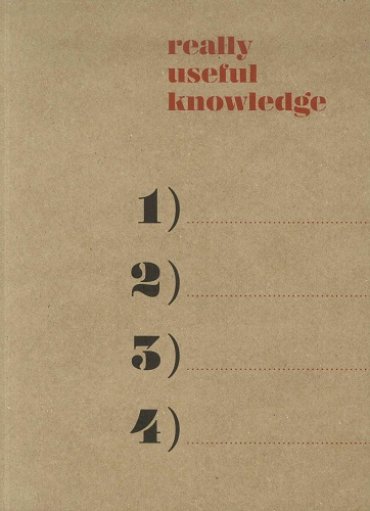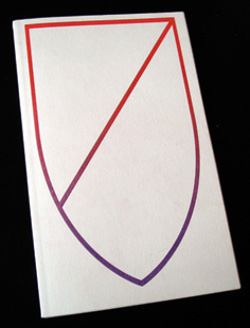Really Useful Knowledge (2014)
Filed under catalogue | Tags: · art, conceptual art, critical pedagogy, education, knowledge, pedagogy, politics, sociology of art, theory, useful art

“This catalogue investigates the notion of “really useful knowledge” and its origins. In the 1820s and 1830s, working class organisations in the UK introduced this phrase to describe a body of knowledge that encompassed various “unpractical” disciplines such as politics, economics and philosophy, as opposed to the “useful knowledge” proclaimed by business owners who had previously begun to invest more heavily in their companies’ progress through financing workers’ education in “applicable” disciplines like engineering, physics, chemistry and mathematics. The publication presents texts and conversations that analyse these themes, including philosophy, art, politics and technology.”
With contributions by What, How and for Whom/WHW, Marina Garcés, Raqs Media Collective, Luis Camnitzer, Trevor Paglen and Jacob Appelbaum, Fred Moten and Stefano Harney, and Gáspár M. Tamás.
Curated by What, How and for Whom/WHW
Publisher Museo Nacional Centro de Arte Reina Sofía (MACBA), Barcelona, 2014
ISBN 9788480264990, 8480264993
285+[10] pages
Discussion: Charles Esche, Manuel Borja-Villel (L’Internationale, 2015).
PDF (14 MB)
Comment (0)Notes for an Art School (2006)
Filed under book | Tags: · art, art education, critical pedagogy, education, pedagogy

“Notes for an Art School is an anthology of essays and interviews by international artists, curators, theorists and educators on the topic of art education. Contributors are Mai Abu ElDahab, Babak Afrassiabi, Julie Ault, Martin Beck, Liam Gillick, Boris Groys, Olaf Metzel, Haris Pellapaisiotis, Tobias Rehberger, Walid Sadek, Nasrin Tabatabai, Jan Verwoert, Anton Vidokle and Florian Waldvogel.
The contributors to the book rethink the goals and structure of an art school, its ideological contexts, the positioning of its students to the art world, its relationship to social and political conditions, and the level of its discursive involvement, drawing on specific examples and on their own experiences to interrogate the appropriateness and validity of existing school models.
In their collaborative essay, Julie Ault and Martin Beck speak about the democratization of academies as a means of generating active social engagement. Boris Groys conjectures that ‘the goal of education is to make the students able to read an apology as a critique’, Liam Gillick addresses ‘the rift between the theoretical components of an art school environment and other practical working aspects of the same place’, and Jan Verwoert tackles the academy as a site of production from the viewpoint of both its defender and critic. Olaf Metzel looks at some possibilities of reaction outside of institutional frameworks, Walid Sadek argues that by positioning itself as an institution in constant flux, the art academy can become a safe haven supporting the proliferation of multiple significations, and Babak Afrassiabi and Nasrin Tabatabai, dissecting the example of Abbas Kiarostami’s film First Case, Second Case, call for knowledge production based on an understanding of the changing nature of discourse. Haris Pellapaisiotis writes about Artalk, a lecture series he organises in Nicosia in absence of alternative institutional frameworks for critical cultural dialogue, while Tobias Rehberger discusses his teaching method as a process of destroying the clichés and preconceived notions that students bring with them into art school, and also provides some personal insight into his own education.”
Edited by Mai Abu ElDahab, Anton Vidokle and Florian Waldvogel
Publisher Manifesta 6 School Books, Nicosia, 2006
[92] pages
Publisher (archived)
Publisher
Paulo Freire: Pedagogy of the Oppressed (1968/2000)
Filed under book | Tags: · critical consciousness, critical pedagogy, democracy, education, pedagogy, society

“The methodology of the late Paulo Freire has helped to empower countless impoverished and illiterate people throughout the world. Freire’s work has taken on especial urgency in the United States and Western Europe, where the creation of a permanent underclass among the underprivileged and minorities in cities and urban centers is increasingly accepted as the norm. With a substantive new introduction on Freire’s life and the remarkable impact of this book by writer and Freire confidant and authority Donaldo Macedo, this anniversary edition of Pedagogy of the Oppressed will inspire a new generation of educators, students, and general readers for years to come.”
Originally published in Portuguese in 1968; First English edition in 1970
Translated by Myra Bergman Ramos
With an Introduction by Donaldo Macedo
30th Anniversary Edition
Publisher Continuum International Publishing Group, New York, 2000
ISBN 0826412769, 9780826412768
183 pages
PDF (updated on 2025-1-24)
Comments (3)
